- Home
- Todd Strasser
No Place Page 7
No Place Read online
Page 7
* * *
By lunchtime I was starving. When it comes to bargains the school lunch is pretty cheap, but the portions are small. On the menu that day was a chicken leg over rice, cauliflower and peas, and applesauce.
Being the best pitcher on the team, I’d been written about in the school and local papers, so the lunch ladies knew who I was. I always made a point of saying hello and asking how they were. When you play team sports, you learn that what a player does off the field can be just as important as what he or she does on it. You represent your town and school, and if you make it big someday, you’ll want the folks back home to say nice things about you. That day Lisa, a skinny blonde with a gravelly smoker’s voice, was behind the counter.
“Think I could have a little more?” I asked when I saw how skimpy that drumstick was.
“You can buy another main course, honey,” she said.
I knew I could, but that would nearly double the cost of lunch and Mom had portioned out the lunch money for one meal per day. So taking a second main course now would mean not having enough at the end of the month. “Thanks. I probably shouldn’t.”
Lisa looked puzzled. “It doesn’t cost that much.”
“Yeah, I know. Thanks anyway.” I slid my tray toward the cashier. They say it’s the little things that count, and I was beginning to see that part of being homeless was not being able to count on the little things, like an extra helping of school lunch. I’d just given the cashier my PIN when Lisa came over with a second helping of chicken and rice in a Styrofoam bowl.
“Here you go, honey,” she said, and gave the cashier a knowing wink.
“Hey, thanks.” My growling stomach appreciated it, but my head felt uncomfortable. Would this be my life from now on? Sneaking into school early to take showers, and depending on handouts at lunch?
As I headed for the table where the usual suspects were sitting, I wondered if it was possible that Lisa had given me the extra food because she’d somehow heard about my family moving to Dignityville. No, it wasn’t possible. Not yet. But how long would it be before the whole school knew?
“Looks like someone’s hungry,” Noah quipped when I put my tray down. Talia smiled at me and turned back to her conversation with Tory. She’d gone with her family to their lake house for the weekend. We’d stayed in touch, mostly texting, but I hadn’t been able to bring myself to tell her about our latest move.
One thing was certain: I wouldn’t be able to avoid it for long.
* * *
By the afternoon I’d really begun to drag. The combination of not getting much sleep the previous night and getting up so early that morning had caught up to me. Back in the day I’d kept a couple of Red Bulls in my locker for moments like this, but when money got tight, I’d let that lapse.
“Think it’s time to get the arm loose?” Noah asked in the weight room after school while we worked out with kettlebells. Every fall after summer showcase ball ended, I rested my arm for two months and focused on core and leg strength.
“Why?”
He cocked his head curiously. “Uh . . . because the Fall Classic is coming up and maybe you ought to prepare for it?”
“Oh, yeah.” I yawned and started another set of swings with the bells. To be honest, I hadn’t thought much about the tournament for the past few days. There’d been other things on my mind. Noah and I agreed that I should probably start throwing at our next workout, and then we went back to core training.
“Need a ride?” he asked later when we left the gym.
I’d known this moment was coming, but my sleep-deprived brain hadn’t figured out how to handle it. Now it was here. I probably should have made up some excuse for walking home, but I was so bushed that I really did want that ride.
When I didn’t answer, Noah frowned. “What’s with you?”
There was no way around it. “We moved over the weekend.”
“Again? Where?”
I stopped walking. We were in the parking lot. The afternoon had turned chilly and you could smell fall in the fresh, dry breeze. I started to say, Swear you won’t tell anyone, but caught myself. Who was I kidding? Sooner or later everyone would know.
Noah waited with a puzzled expression on his face.
“Dignityville.” No matter what Aubrey said about being a pioneer in a new way of living, it felt humiliating to hear those words come out of my mouth. I, Dan Halprin, was officially homeless.
Noah looked down at the asphalt and crushed a dry brown leaf with his shoe. “Sorry, man.”
“Me too.”
We got into his car and I told him how Dad and Uncle Ron had never gotten along, and how Mom couldn’t take the stressful, negative atmosphere in that house.
“Told Tal?” Noah asked.
“Not yet.”
He shot me a look like, Are you serious?
“Yeah, yeah, I know.”
“You don’t want her to find out from someone else,” he advised.
“I don’t want her to find out, period,” I muttered, once again feeling something that I’d been trying really, really hard to resist: anger and resentment . . . not at Talia, not at the world, but at my parents.
It was thanks to them that I was suffering this embarrassment.
We drove the rest of the way in silence. But when we got into town I couldn’t go straight back to Dignityville. “That’s good.” I pointed at a Starbucks.
“Free Wi-Fi?” Noah guessed, pulling over.
“You got it. Thanks for the ride.”
Noah drummed his fingers on the steering wheel and gave me a grave look. “If there’s anything I can do, you know?”
“Thanks, man.”
“Need a lift in the morning?” he asked.
When we’d lived a half-dozen blocks from each other, getting rides to and from school was no big deal, especially since Noah and I were on the same schedule. But giving me a ride now would mean going miles out of his way.
“I can manage,” I said.
“On what? The bus?” He knew how much I hated riding with the middle schoolers. And I had yet to figure out if the public system went anywhere near school.
“Since when do you get up any earlier than you have to?” I asked.
“Hey, ain’t no biggie, white boy.”
13
It wasn’t easy to sit in Starbucks and do my homework. I’d had one meal that day—lunch—and I was starving. The brownies and muffins called out to me, and the scent of coffee just made it worse.
Plus, I was trying to deal with all this stupid internal strife. Alternately feeling angry at my parents for dragging me to Dignityville, and then feeling guilty for being angry at them.
Why couldn’t Dad have kept just one of those jobs he’d started and lost in the past year?
Even if Mom couldn’t find another job as a stockbroker, couldn’t she have gotten work doing something else?
But she wasn’t happy in that world. . . .
Yeah, well, I was not happy in this world. . . .
It wasn’t quite dark when I left Starbucks, and I was famished. In Dignityville the dining tent was crowded, but I passed it and went to my own tent instead. Mom was inside, lying on her sleeping bag, reading The Zen of Gardening in the lantern light. The sweet, perfumed scent in the air meant she’d burned incense to get rid of the musty smell.
“There you are,” she said. “Have you eaten? You must be starved.”
“Want to go over and get me something?” I asked.
Mom closed the book and sat up. “You can’t avoid it, sweetheart. Now come on, I’ve been waiting for you.”
“What about Dad?”
“He’s out somewhere.”
I didn’t want to go into the dining tent, but it looked like I had no choice. Maybe it didn’t matter. I was still living in Dignityville whether I ate there or not.
It was warm and humid inside the Grand Ballroom. People of all ages—couples, families with kids, and old folks—were chowing down. Just like a
t school I picked up a tray and a plastic knife and fork, and got in line. The woman in front of me was wearing a city bus driver’s uniform. It still seemed weird that you could have a job and yet be homeless, but I had a feeling it was just one more thing about this new world that people had to get used to.
Dinner was spaghetti and meatballs, salad, and bread and butter. Pony-tailed Wade was one of the people who served us, and I remembered him saying that everyone at Dignityville took turns serving or cleaning up. Our trays full, Mom and I found an empty table. It’s strange how the hungrier you are, the better everything tastes. The spaghetti was pretty good, and the meatballs were tasty enough to make me wonder if I could go back for more. Lucky for me, Mom being a vegetarian, gave me hers.
“Feel like company?” Meg and Aubrey approached our table. Even though he looked older, I wondered if they were a couple. Meg smiled as if, now that I was also living in Dignityville, she was willing to forgive me for that humiliating scene in that empty classroom the week before.
“Please do,” Mom said.
“I thought you looked familiar, Dan.” Aubrey set his tray down. “Meg told me you pitch for the school and I realized I’ve seen you. You’ve got great stuff.”
“Thanks.” There’d once been a baseball player called Shoeless Joe Jackson. Maybe someday I’d be known as Homeless Dan Halprin.
Aubrey turned to Mom. “We’re going to need the town’s approval for that garden. Maybe we could work on the proposal after dinner? And I think it would be really helpful if you went to the meeting at Town Hall this Friday and spoke about how beneficial it would be, and how it would save the town money. That’s really what they want to hear.”
He turned to me. “So, Dan, how’s it going?”
“Okay,” I lied.
Aubrey narrowed one eye as if he knew I wasn’t being sincere. “Listen, it takes a while. And even then this place isn’t for everyone.”
Mom nodded in agreement. “Just give it a chance, sweetheart.”
“Anything else on your mind?” Aubrey asked.
There was: “Any part-time work around here? Like on the weekends?”
Aubrey pressed his lips together thoughtfully. “It’s all on a voluntary basis here. No one gets paid.”
“I meant, like, in town?” I said.
“Unskilled labor?”
“Uh-huh.”
He shrugged. “There’s not much, and a lot of people are vying for what there is. Some guys check the bulletin boards at the post office and supermarkets every morning. You just have to get lucky.”
“You have a job?” I asked.
“I told you he did,” Meg said.
Huh? When had she and I talked about Aubrey?
“Remember that day at my locker?” she said. “I told you both my mom and brother had jobs.”
Brother? I guess I must have looked surprised, because Aubrey chuckled and put his hand on Meg’s head. “Meet my little sister.”
“Gotcha.”
We were joined by Joel, the heavyset guy with the bushy beard who we’d met two days ago. “Aubrey, we gotta talk about the bikes.”
“Sure.” Aubrey got up to leave, then paused as if he’d just thought of something. “Know Ruby’s Bar and Grill on the other side of town, just off Main Street? Why don’t you swing by there around five on Wednesday? We’ll talk to my boss. He might have a job for you.”
After he left, I turned to Meg. “Nice guy.”
“Great guy,” said Meg. “Of course, I’m biased, but he really cares. And he’s trying to do something.”
“What’s that about bikes?” Mom asked.
“They’re starting a bike drive,” Meg said. “You know how they have coat and food drives? This’ll make it easier for the people here to get around town.”
Mom finished dinner and went back to our tent. Left alone with Meg, I felt a nagging sensation. “So . . . about the other day in that classroom, I—”
“It’s okay,” she cut me short. “What goes on between you and your girlfriend is none of my business.”
“Yeah, but it made me think,” I said.
Meg feigned a wide-eyed, astonished look. “Really?”
“Why do you have to be such a wise guy?” I asked with a smile.
Meg smiled back, but before she could reply, an argument broke out in the TV area at the back of the tent. A couple of old guys were growling at each other, probably about what show to watch.
“Hard to believe.” Meg sighed. “One day you’re just like everyone else with a house in a nice town, and the next day . . .”
“You’re a pioneer in a new, bold experiment in living?” I finished the sentence.
She gave me a sour look.
“You don’t buy it?” I asked, surprised. “But he’s your brother.”
“Sometimes I buy it,” she said. “And sometimes . . . I sit in that tent and think, ‘How can this be happening?’ ”
I raised my hand, palm out, and she slapped it.
“Do your friends know?” I asked.
“Only a few,” Meg said. “We didn’t move to Median until I started high school, so I don’t have all that many friends. But you, on the other hand . . .”
If Meg knew the truth, she would have been surprised. I was “friendly” with lots of people, but there was only a handful that I was really tight with.
We stayed at the table in the dining tent and talked about school, friends, homelessness, and life in general. To be honest, by the time we’d finished, I couldn’t say I felt one bit better about being in Dignityville, but having Meg there did make it feel a little more bearable.
14
I resolved to tell Talia about Dignityville the next day after lunch. But when I came out of the lunch line and sat down, she pressed her lips close to my ear and whispered, “When were you going to tell me?”
“Never?” I whispered back.
The faint lines in her forehead deepened ever so slightly. She didn’t get the joke. But maybe she wasn’t supposed to. I let out a long sigh to let her know that I didn’t need to be interrogated at the lunch table in front of our friends, but Talia either didn’t get it or didn’t care.
“So what happens now?” she whispered.
“With what?” I asked.
“You’re not going to stay there, are you?”
There’s a deep sinking, regretful sensation you get when the bases are loaded and you give up a grand slam. I’d thought that feeling was limited to baseball.
Can you believe Talia Purcellen’s boyfriend is living in that tent city for homeless people?
Poor Talia. How humiliating!
I could have said something nasty. Maybe, Sorry if it messes up your social life. But that would have been my own anger and frustration leaking out.
Talia started to say something more, then stopped and glanced at Tory as if she could feel her trying to listen in on our conversation. More than anyone else in our crowd, Tory was the great social arbiter, whose say about what we did and who we did it with carried more weight than anyone else’s.
I motioned to Talia that if she wanted to keep talking we should go somewhere else. When we rose from the table, Tory’s eyes narrowed with disapproval.
We went out to the courtyard and sat on a bench. It was chilly and Talia hugged herself. “Your dad’s still looking for a job, isn’t he?”
Was she trying to come up with the explanations she imagined she’d need when our friends asked about me being homeless?
“Oh, yeah,” I said, although he’d probably have better luck panning for gold in the muddy stream that ran behind Dignityville. Jobs running sports programs for poor inner-city kids no longer existed. The government couldn’t afford them anymore. But even that wasn’t the whole story. Like Mom, Dad just seemed to be giving up.
Talia hunched over and squeezed her hands between her knees as if some invisible weight was pressing down on her. She might have even been fighting back tears. Someone else might have given her grief
for thinking only of herself. But that wasn’t fair. When I’d started dating her it wasn’t because of her politics or great humanitarian endeavors. It was because she was a hot, popular chick. And she’d started dating me because I was a popular, studly jock.
Not a popular studly homeless jock.
“Listen, Tal, it’s not like we lost our house on purpose.”
She nodded. “But you . . . you can’t just stay there.” It was like she couldn’t accept it. Like this wasn’t the reality she felt entitled to.
Even though we were outside, I dropped my voice. “Seriously? I didn’t decide to become homeless, and my parents didn’t decide to lose their jobs. I mean, maybe a little understanding is in order, don’t you think?”
Talia nodded, but didn’t look at me. Her mood seemed so forlorn that I added, “It’s not like someone died.”
She worked a jagged smile onto her face, but kept her eyes averted. I could tell she wasn’t buying it.
Oh, great. My parents lose their jobs and we lose our home.
And now I’m going to lose my girlfriend.
I put my arm around her shoulders. “Come on, Tal, how do you think it makes me feel when you act like me living in Dignityville is so horrible?”
She sniffed. “I’m sorry, Dan. It’s . . . just not what I expected.”
“Well . . . believe me, that makes two of us.”
15
That afternoon Noah and I went out to the field behind school and started throwing. Not pitching, just lobbing the ball back and forth as we began the process of getting my arm loose after not pitching for two months. It was a warm, sunny afternoon and might have been enjoyable had I not had the twin burdens of homelessness and Talia.
We’d probably been throwing for about fifteen minutes when Tyler Buchholz and Zach Raines strolled out. Tyler was our first baseman and probably the best hitter on the team. He’d also been invited to the Thanksgiving tournament.
“How’s the arm feel?” Zach set down his backpack and unzipped it.

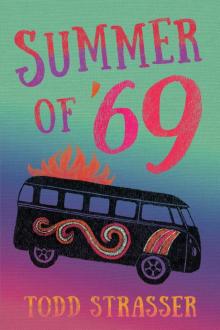 Summer of '69
Summer of '69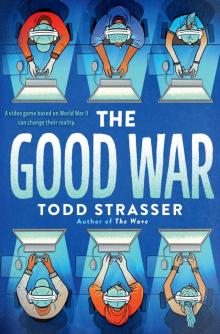 The Good War
The Good War Famous
Famous If I Grow Up
If I Grow Up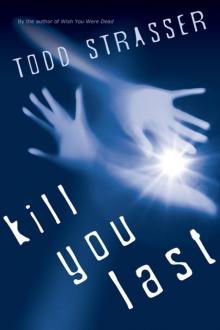 Kill You Last
Kill You Last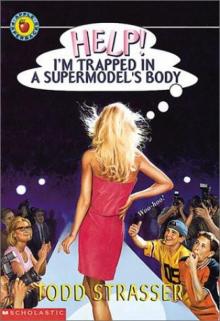 Help! I'm Trapped in a Supermodel's Body
Help! I'm Trapped in a Supermodel's Body Price of Duty
Price of Duty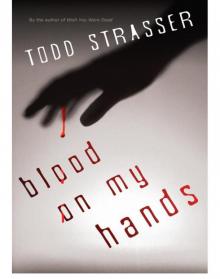 Blood on My Hands
Blood on My Hands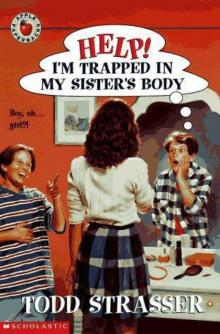 Help! I'm Trapped in My Sister's Body
Help! I'm Trapped in My Sister's Body sidewayz glory
sidewayz glory The Beast of Cretacea
The Beast of Cretacea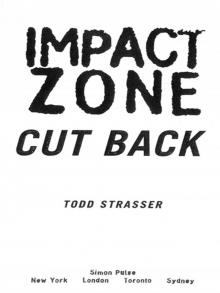 Cut Back
Cut Back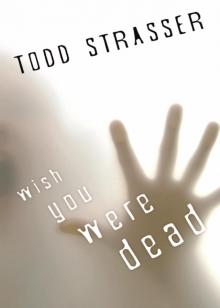 Wish You Were Dead
Wish You Were Dead The Wave
The Wave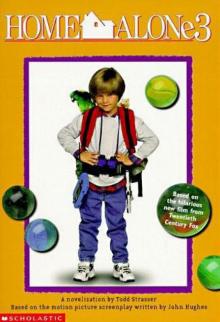 Home Alone 3
Home Alone 3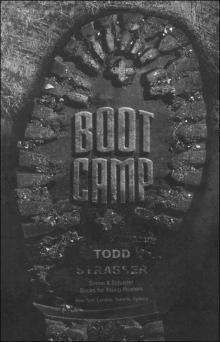 Boot Camp
Boot Camp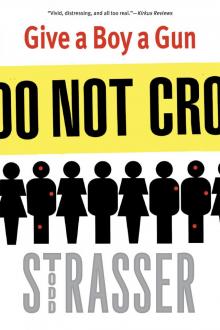 Give a Boy a Gun
Give a Boy a Gun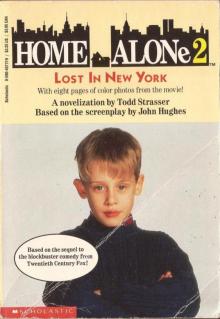 Home Alone 2
Home Alone 2 The Shore
The Shore Can't Get There from Here
Can't Get There from Here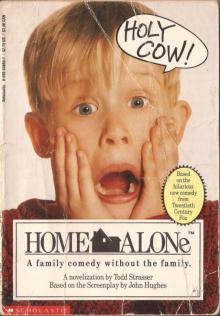 Home Alone
Home Alone Close Out
Close Out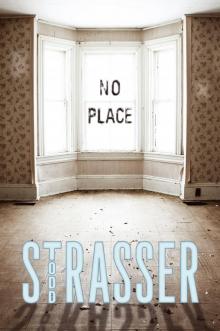 No Place
No Place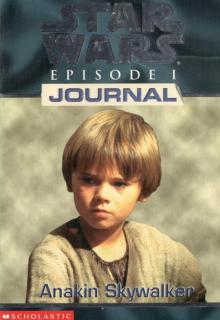 Star Wars - Episode I Journal - Anakin Skywalker
Star Wars - Episode I Journal - Anakin Skywalker